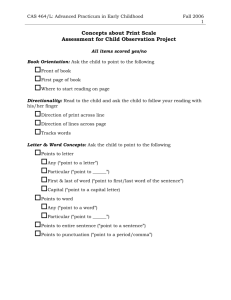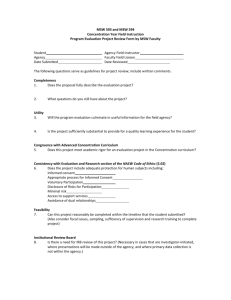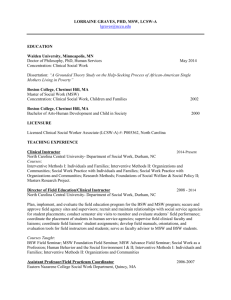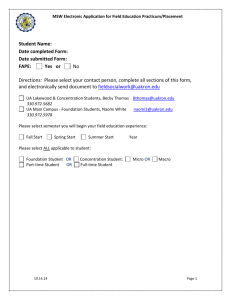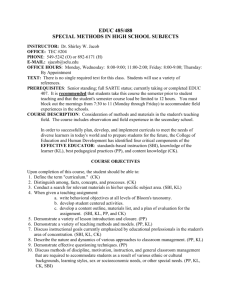Adjunct Faculty Orientation
advertisement
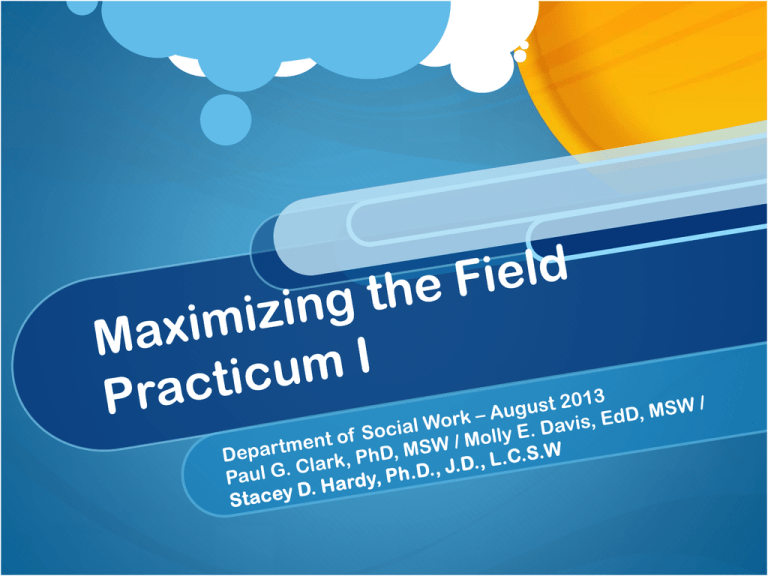
Introductions Name Agency Represented Your role there First time teaching field instructor? First time with GMU? A positive characteristic of your favorite FI when you were an MSW student. Workshop Goal Enhance and enrich the partnership between the university field education program and community-based agencies toward producing competent, conscientious and compassionate social work professionals. Workshop Objectives Participants will: Understand the philosophy and purpose of the field practicum experience in the context of social work education. Explore the tools needed to direct high-impact learning experiences of social work students (e.g. critical thinking and ethical decision making). Understand Council on Social Work Education (CSWE) competencies and how to translate these into experiential learning activities. Workshop Objectives (cont.) Learn techniques and strategies to strengthen the agencybased field program. Understand the layers of university support and how to utilize university resources to prevent and address field issues. Examine the field experience from beginning to end in terms of student, school and agency roles. Value the role field education plays in defining the quality and nature of our profession. Agenda Overview of Social Work at GMU The Field Philosophy Field Training Cultural Competence Who’s Who - roles and responsibilities Agenda Documentation, Forms and the ipt system (software/technology) The Field Practicum from Beginning to End The Application, Matching and Referral process Supervision - Clinical, Legal and Ethical Factors Trouble-shooting and Problem Resolution Evaluation and Transition Overview of Social Work at GMU Characteristics we Hope to Cultivate in Students and Future SW Colleagues: Strong identity as a social worker (versus a “role” or “job”) Social work core values-driven practice Ability to problem solve and think critically and creatively Social workers with initiative, collaborative skills, and the ability to integrate various contexts in any given situation SW at GMU: How we get them there BSW (junior and senior years) MSW Foundation MSW Concentration Generalist Practice Foundation BSW Introduction to Social Work Interpersonal Communication Methods of Intervention (individuals, groups, families, communities) Human Behavior (life course and macro systems) Social Policy, Social Justice, and Policy Analysis/Advocacy Research & Statistics Senior year: 450 hours in the field Generalist Practice Foundation MSW Foundation Year Communication and Technology for SW Practice Direct Social Work Practice Human Behavior & Social Systems Social Policies, Programs, and Services and Social Policy Advocacy Research Methods Foundation year: 450 hours in the field MSW Concentration: Clinical Practice Core: Advanced Clinical Practice Community-Centered Clinical Practice Psychopathology Advanced Research in SW MSW Concentration: Clinical Practice (cont.) Advanced Clinical Practice & Policy: Forensic SW Practice Family Therapy Trauma and Recovery Military Social Work Substance Abuse Interventions Clinical Practice with Older Adults Immigration Policy Social Policy for Children and Youth Aging Programs and Policies Electives Clinical Practicum: 600 hours in the field MSW Concentration: Social Change Core: Social Work and the Law Organizational Leadership for Social Workers Empowering Communities for Change Advanced Research in SW MSW Concentration: Social Change (cont.) Advanced Policy Courses: Immigration Policy Social Policy for Children and Youth Aging Programs and Policies Electives Social Change Practicum: 600 hours in the field The Field Philosophy Field Instruction as an Investment in the student in the agency in the profession Field Instruction as Community Service giving back passing the torch to the “next generation” Field Instruction as Professional Growth Field Training Council on Social Work Education (CSWE) Guidelines Educational Policy and Accreditation Standards (EPAS, 2008) Educational Policy 2.3 Signature Pedagogy: Field Education: “Signature pedagogy represents the forms of instruction and learning in which a profession socializes its students to perform the role of practitioner…in social work, the signature pedagogy is field education.” CSWE Competencies CSWE Competencies (At all program levels – BSW and MSW) 1. Identify with the social work profession and behave professionally. 2. Apply social work ethical principles to guide professional practice. 3. Apply critical thinking to inform and communicate professional judgments. 4. Engage diversity and difference in practice 5. Promote human rights and social justice. CSWE Competencies (cont.) 6. Engage in research-informed practice and practice-informed research. 7. Apply knowledge of human behavior and the social environment. 8. Engage in policy practice to deliver effective social work services. 9. Respond to and shape an ever-changing professional context. 10. Engage, assess, intervene, and evaluate with individuals, families, groups, organizations and communities. Cultural Competence – Working with People who have been Marginalized Encourage cultural competence in training and supervision Be mindful of cultural aspects of the organization or agency, service delivery and within the supervisory relationship age SES/educational background gender ethnicity/race religion sexual nature others Field-based Learning across the Curricula BSW Junior Year Human Service Experience Requirements 60 hours in human service context BSW (Senior Year) and Foundation (1st year) MSW MSW (2nd year) Concentration year Clinical AFI must be 3 years post masters (all other practicum levels require AFI to be 2 years post masters) 300 hours per semester* Parallel curricula BSW- 225 hours per semester* MSW 1st year - 225 hours per semester* * minimum requirement and does not include time required to attend field seminars Who’s Who - Roles and Responsibilities Field Director Associate Field Director Field Coordinator Faculty Field Liaisons Agency Field Instructors Task Supervisors Task Supervisors MSW or Non-MSW field supervisors assigned by the Agency Field Instructor to provide specialized instruction reports to the Agency Field Instructor regularly regarding all matters related to the student’s performance Agency Field Instructor maintains primary legal and supervisory responsibility for the student and related documentation Documentation All forms are found in the Field Manual, available online at: http://chhs.gmu.edu/sw/fieldeducation Format of documents may change to better reflect curriculum goals and professional competencies Ipt system – Intern Placement Tracking http://www.runiptca.com/web/login.php Documentation (continued) Weekly Journals components: Summary of field activities Highlights and Challenges Competencies demonstrated Ethics / Values Issues What would improve your learning; Learning objectives for next week Used to document professional growth and skill Process Recordings (2 per semester or more) development Documentation (continued) Time Log of Field Hours should be submitted and signed weekly – helps to identify if the student is on-track for completing requirements on schedule Are there excessive absences? Do activities reflect goals outlined in the learning agreement? Do activities match what the student should be doing at that point in the semester? Is supervision happening regularly RISK MANAGMENT Learning Agreement Field Practicum from Beginning to End Placement Process: Field Practicum from Beginning to End The Interview Identification of appropriate candidates agency or student may decline opportunity for interview Interview Strategy: Use of vignettes best and worst case scenarios information about skills and weaknesses issues that may interfere with service delivery Field Practicum from Beginning to End The Interview – (cont.) Interview Strategy: Review background to match student to activities to guide orientation and supervision Interview Strategy: Introduction to organizational structure and agency functions Field Practicum from Beginning to End Making the Offer: Adapting employee policies Background checks, drug testing, medical clearance, etc Identifying an agency field coordinator Functions as primary contact to GMU Field Program Secure Offer for Internship Is ALWAYS the agency’s decision to accept/fail to accept a student Student follows up by completing electronic confirmation form and provides significant information regarding placement location and field instructor contact information Field Practicum from Beginning to End Issue: Employment with/by Internship Setting – Generally not permitted Petition for employment must be submitted AND approved before credit can be obtained for practicum Never offer students employment in the middle of the practicum this drastically changes their status with the agency and the practicum component of the Department of Social Work consider a stipend as an alternative any changes in the student’s status must be reviewed by the Field Liaison and Field Director Field Practicum from Beginning to End Supervision Required - 1 hour of clinical and/or administrative supervision weekly by the Agency Field Instructor (MSW) with access to AFI or preceptor daily plan for AFI/task supervisor availability (i.e., vacations) Frequent and regular communication with task supervisor critical for evaluation and problem-solving Preparation for supervision use agendas, learning agreements and journals Accountability document, document, document Mandating student accountability for hours, assignments, quality/ethically based work Legal issues: Vicarious Liability & Risk Management Field Practicum from Beginning to End Trouble-shooting and Problem Resolution Student or Agency Field Instructor may initiate this process Step One: monitor and document problem areas verbally address with the student establish plan for improvement explore clinical and ethical concerns consider a “Memo of Concern” Step Two: contact Field Liaison for a meeting Corrective Action Plan form evaluation of progress toward problem resolution Step Three: contact Field Director evaluation for further intervention or field practicum termination or change Field Practicum from Beginning to End Evaluation and Transition Evaluation should be a continuous process evaluation competencies should be reviewed in the beginning there should be no “surprises” on the evaluation form forms should be ACCURATELY reflect student competencies relative to level in the training program by semester “grade” or reluctance to put information “on the record” should not interfere with ratings or narrative students evaluate practicum experience and Agency Field Instructor as feedback to University and Field Education Program Field Practicum from Beginning to End Transition begin early to prepare the student for transition with clients, the agency and “role” as student “endings as beginnings” A Final Thought Aoccdrnig to a rscheearch at Cmabrigde Uinervtisy, it deosn't mttaer in waht oredr the ltteers in a wrod are, the olny iprmoetnt tihng is taht the frist and lsat ltteer be at the rghit pclae. The rset can be a toatl mses and you can sitll raed it wouthit porbelm. Tihs is bcuseae the huamn mnid deos not raed ervey lteter by istlef, but the wrod as a wlohe. A few more?.... A vheclie epxledod at a plocie cehckipont near the UN haduqertares in Bagahdd on Mnoday kilinlg the bmober and an Irqai polcie offceir Big ccunoil tax ineesacrs tihs yaer hvae seezueqd the inmcoes of mnay pneosenirs A dootcr has aimttded the magltheuansr of a tageene ceacnr pintaet who deid aetfr a hatospil durg blender Documentation (continued) The Learning Agreement a “contract” for the semester tool to identify core competencies (BSW, MSW) 2nd semester - should reflect increased autonomy and responsibility used to evaluate progress and problems micro, mezzo and macro activities as appropriate protects the student, the agency and the school an addendum can be submitted at any time to reflect changes to activities Documentation (continued) The Learning Agreement (continued) S.M.A.R.T. Goals Specific Measurable Achievable/Accountability Realistic & Relevant Timeline Documentation (continued) What Students Need to Submit to the Field Program Learning Agreement column (1) of LA/Eval document approximately 3rd week of semester (to be kept in file at school) Midterm column (2) of LA/Eval document; the mid-term evaluation, reviewed with the student (and task supervisor, if appropriate) and signed by the AFI and student journal entries for the first half of semester should be completed in IPT time logs for first half of semester should be completed in IPT Documentation (continued) Evaluation Forms includes both numerical ratings and narratives the evaluation comprises 30% of the total grade at final items reflect CSWE identified competencies midterm evaluations should reflect the student’s progress toward competencies - excessive “5” ratings at midterm raise the question of the quality of experience for the second half of the semester, i.e., what are students gaining from the rest of practicum? A pattern of excessive “1” ratings reflects significant underperformance Essentially… Students should be evaluated on how they are performing AT THEIR LEVEL, i.e., a first semester BSW student, second semester concentration MSW, etc. & over the semester time period. problem areas and strengths should be clearly documented
